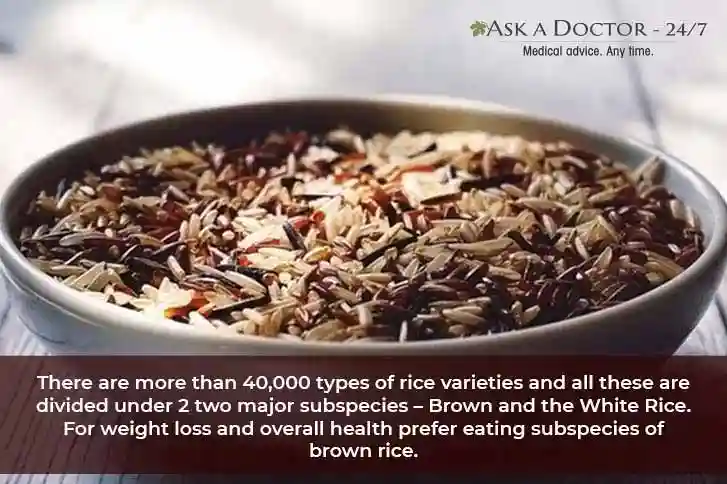Eating Rice Makes You Obese Or Protects You From Obesity? Here's The Fact!
Obesity or being overweight is one of the growing health concerns around the world. Two prime causes of obesity are unhealthy food habits and lack of physical activity. When we talk food, rice is one of the main staples that is often linked with obesity and excessive weight gain. But, did you know that contrary to the fad many scientific studies have proven that rice actually helps in lowering the obesity risk! Yes you read it right!!! The only condition is you should eat the right variety of rice and in a limited portion.
Read the blog till end to unravel all your myths related to rice and obesity.
Know about the varieties of rice and which one to eat to beat obesity?

Asian rice (Indica and Japonica), African rice, wild rice, black rice, Arborio, basmati, jasmine etc., are some of the popular varieties of rice. Each variety, except the white rice, plays a different role in fighting against major diseases such as obesity, high blood pressure, digestive issues, and even chronic conditions like cancer. Among all mentioned above, red, brown, and black rice are considered the best for weight loss.
The outside husk coated over the unprocessed varieties of black, red and brown rice preserves the antioxidants, magnesium and high fiber content inside the rice grain. Also, these unprocessed varieties stand low on glycemic index, which is why they help curb our appetite, keeping us full for long time and thus, accelerating the weight loss.
How much rice should one eat in a day for effective weight management?

Researchers from all across the globe have calculated and shared that an average rice consumption of 50 g per person per day (which mean one-quarter of a cup of rice per day) would reduce the worldwide prevalence of obesity by 1%.
If you too are among those anxious people who worry about their weight management but still not ready to give up rice, then here’s the guideline that will prove a boon for you. Follow the below given instructions religiously to enjoy your bowl of rice without fearing for obesity:
1. Keep the ratio to one portion of rice and one or two potions of other foods like a bowl of pulse and green veggies, per meal.
2. Consume unpolished/unprocessed rice cooked along with vegetables, lean meats (fish), greens, lentils etc.
3. Opt for steamed, boiled or baked rice recipe and avoid fried rice.
4. Do not add extra fat such as ghee, butter or oil while cooking rice. This can unnecessarily add extra calories to your diet and cause weight gain.
5. Make sure to soak the rice well before cooking it. Wash it 3 to 4 times to remove extra starch. Boil the rice with enough water to keep the starch levels low.
6. Prefer prepare a recipe by mixing different varieties of rice to a desired amount. This way, you can get umpteen nutrients from assorted rice varieties all at once.
Having said all above, make sure to consult a Dietitian online to know about your BMI (Body Mass Index) and whether or not you fall in the obese category or not. S/he will work closely with Bariatric Physicians, Nutritionists, Endocrinologists and Psychologists to plan a proper rice diet as well as an immediate treatment strategy, if you fall into the obese category.
Looking for more information on rice dietary benefits and concerns related to obesity then you can seek help from our online Specialist, NOW! Our team of experts will help you manage your diet and lifestyle to avoid the risk factors of obesity.
Ask a Specialist
Recent Questions


